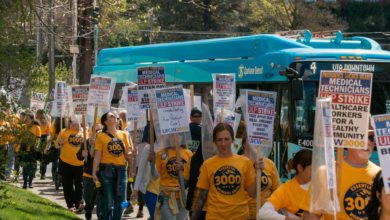Photo: Camp Hope 2.0 in Spokane. Credit: Jewels Helping Hands, used with permission
At around 4:00 AM on the morning of December 10, houseless people and community organizers in Spokane, Washington, began to set up an encampment in front of City Hall. The encampment, Camp Hope 2.0, was set up with the help of volunteers from a local non-profit called Jewels Helping Hands in response to the refusal of the City of Spokane to open a warming station and provide low-barrier shelter when cold weather began this year.
In a press release issued by Jewels Helping Hands on December 8, the group explained their decision to form the encampment.
“Each year the City of Spokane must scramble to open a warming center because of the temperature drop, and they failed to plan. This year we enter the winter with our lowest number of low barrier shelter beds in recent years due to a decision made by this Administration to eliminate shelter beds. We currently have 496 low barrier shelter beds in our city and over 1,500 people experiencing homelessness during the last point-in-time count. The City has received over $80 million from the Federal CARES act that can and should be used for this issue. The state offered millions more this month and our city officials did not even apply for the funds. This is not a money issue; it is a willingness to act.”
Rather than providing adequate shelter, the City of Spokane has in the past several years increased the number of city-wide sweeps, unleashing violence against unhoused people, to clear public areas of those they deem undesirable. Organizers see this as an intentional campaign to disenfranchise the poor while they hoard the money allocated for services intended to help people.
“You’re literally watching the dehumanization of an entire population of people,” said Julie Garcia, lead organizer of Jewels Helping Hands. “When you can dehumanize people, they get treated like animals, and we think of them like animals. We don’t care if they die on our streets. We don’t care that 140 people experiencing homelessness have died in the last 18 months. They’re all humans. They froze to death on our streets and nobody seems to care. There wasn’t an obituary in the paper. And most of the time they’re not even picked up and identified.”
For the past three years, Jewels Helping Hands has been instrumental in providing outreach services and permanently housing people living on the streets. Previously, they mobilized volunteer and community support to challenge the City of Spokane policy, including the original Camp Hope in November and December of 2018. As a result of Camp Hope and subsequent actions, Garcia says, “It was decided that any city-funded shelter coming into our system needs to have low barrier beds. And that low barrier beds could not be replaced with high barrier beds, but could not be taken away without a replacement somewhere in the system.”
But Garcia says the City has not held up that agreement. “We’ve seen those laws change, yet they’re not adhered to, because they will get rid of about 102 low barrier beds at Salvation Army, and we’ve still yet to replace them in our system.”
The City of Spokane held its final City Council meeting of the year on the night of December 13. Community members and organizers attended, pressuring the city to take action, but the only item proposed during the meeting in response to Jewels’ demands was a temporary warming station to open within 24 hours. The number of beds and whether they are low-barrier is to be determined. No long-term solution was offered.
Organizers are not certain the city will be able to house the 160-person encampment in its entirety, even temporarily, to meet their demands. “It will never help poor folks if we’re paying $1.8 million for a warming center. A warming center with no services. A warming center where we’re just housing people in a building,” said Garcia. ”To stay at the Cannon Street shelter it’s $1,900 a month, per person. We can house people for that. Yet we’re paying for them to sleep on a mat on the floor with zero services. That’s ridiculous. Or paying $2400 for them, 1 person per month, to stay at the Way Out shelter. It’s not even open right now. They are funded and still not open. And their barriers are so high that I don’t have one person that matches their criteria. And I touch and deal with at least 1,000 to 2,000 people experiencing homelessness a week. And I still have no one that meets their barriers.”
Not long after the City Council meeting, the encampment was issued with a 48-hour eviction notice. Organizers, many of whom have nowhere else to go, say they are ready to stay if the needs of the people aren’t met. The camp plans to remain in place until the next City Council meeting in January or longer, if needed.
“What caused us to start this was a camp of 50 people being threatened to be moved. There’s men, women, and children at that camp,” Garcia said. “That camp has been there for over a year. It’s been there. We’ve been caring for them for over a year. Why would you go in there and ask to move them when we know there’s zero beds? We know there’s none. The police know there’s none. Everyone knows there’s no beds. Why would you try and move 50 people? Where do you expect them to go?”
“We are prepared to face charges,” Garcia added. “We have bail funds available to donate to. We have a whole community.”
The eviction for the encampment is scheduled for 10:30 AM on Dec 16. Organizers are asking the public to take the following actions:
- Call Mayor Nadine Woodward at (509) 625-6250 and tell them what they can do to meet the demands, using this script.
- Email Mayor Woodward’s office
- Sign the petition led by SCAR (Spokane Community Against Racism)
- Donate to Jewels Helping Hands at www.jewelshelpinghands.org
- Donate to local Spokane organizations who are supporting those on the front line!




